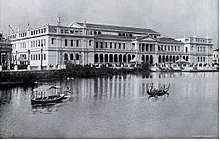Mary Stuart Smith
Mary Stuart Harrison Smith (February 10, 1834 – December 8, 1917) was an American writer, translator, and women's advocate.
Smith is prominently memorialized at the University of Virginia chapel—she was likely a participant in the funding and creation of the chapel as a resident of the campus at the time.
[3] Smith’s education was provided by family and private tutors—her grandfather and father taught philosophy and ancient languages, respectively.
[4] She studied Latin, German, French, Italian, and Greek, and she demonstrated a proclivity for poetry beginning at age 13.
[5] Critics thought Smith had a special gift for translating German poetry, including her Chidhe in the Overland Monthly.
From Ernst Werner, she translated A Hero of the Pen, Hermann, Good Luck, What the Spring Brought, St. Michael, A Judgment of God, and Beacon Lights.
Her translations from other German writers were Lieschen, The Fairy of the Alps, The Bailiff's Maid, Gold Elsie, Old Ma'amselle's Secret, The Owl House, The Lady With the Rubies, Serapis, The Bride of the Nile, and Lace by Paul Lindau, and others.
[5] Her work includes books for children, also translations from the German, such as The Canary Bird and Other Stories and Jack the Breton Boy.
Among her best review articles were Askaros Kassis Karis, Robert Emmet, Queen Louisa of Prussia, John of Barneveldt, What the Swallows Sang, The Women of the Revolution, The Women of the Southern Confederacy, Madame de Stael and Her Parents, The Necker Family, Madam Recamier, Mary and Martha Washington, and The Virginia Gentlewoman of the Olden Time.
[5] Smith also made numerous contributions of practical articles in Harper's Bazar, as well as others in the American Agriculturist, Good Housekeeping, and other periodicals.
[5] Smith spoke on "The Virginia Woman of Today" and included an anecdote reflecting the admitted, but officially unacknowledged, ability of Virginia women in the fine arts:"Mr. Lewis Ginter, one of Richmond's wealthiest citizens, sent an order to New York for two watercolor drawings...and the art dealer there sent him two that were executed by Miss Williams of Mr. Ginter's own city.
She fills with stuffs, sweet scented chests, Her busy spinning wheel ne'er rests: And heaps the well scoured presses full Of snowy linen, glistening wool.
[14] This article incorporates text from this source, which is in the public domain: F. E. Willard's A Woman of the Century: Fourteen Hundred-seventy Biographical Sketches Accompanied by Portraits of Leading American Women in All Walks of Life (1893)
